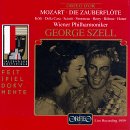| All Artists: Wolfgang Amadeus Mozart, George Szell, Vienna Philharmonic Orchestra, Alfred Jerger, Alois Pernerstorfer, Erich Majkut, Erika Koth, Friederike Sailer, Graziella Sciutti, Hans Hotter, Hetty Plumacher, Karl Donch, Kurt Böhme, Lisa Della Casa, Léopold Simoneau, Robert Charlebois, Sieglinde Wagner, Soloists of the Vienna Boys' Choir, Walter Berry Title: Mozart: Die Zauberflöte Members Wishing: 0 Total Copies: 0 Label: Orfeo D'or Release Date: 9/16/2000 Album Type: Import Genres: International Music, Classical Styles: North America, Opera & Classical Vocal, Historical Periods, Classical (c.1770-1830), Modern, 20th, & 21st Century Number of Discs: 2 SwapaCD Credits: 2 UPC: 789368604524 |
Search - Wolfgang Amadeus Mozart, George Szell, Vienna Philharmonic Orchestra :: Mozart: Die Zauberflöte
 | Wolfgang Amadeus Mozart, George Szell, Vienna Philharmonic Orchestra Mozart: Die Zauberflöte Genres: International Music, Classical
|
Larger Image |
CD Details |
CD ReviewsA mono live recording from 1959, but it IS George Szell with Craig Matteson | Ann Arbor, MI | 11/01/2005 (4 out of 5 stars) ""The Magic Flute" is a very late work in Mozart's too brief life. It premiered on September 30, 1791 and the great composer died on December 5, 1791. The opera has many aspects of a fairy tale about it, and too many dismiss it as a kind of children's opera. It certainly is entertaining and Popageno provides some very broad humor. However, there is also a great deal of subtlety that people often miss. The broad outline of the story of Tamino going through trials to earn the love of Pamina, Popageno finding Papagena despite himself, and the apparent conflict between Sarastro and the Queen of the Night are seemingly simple until you pay attention to all that is going on. It becomes almost impossible to resolve everything.
Beethoven regarded this opera more highly than "Don Giovanni". I suspect his is a minority opinion, but he felt this opera dealt more seriously about the ideal love between a man and a woman whereas the story of the Don focuses too much on human weakness and hypocrisy. Who is to say he is wrong? Because there is much spoken dialogue, unusual in opera, this opera is more often done in the local tongue than other operas. However, this recording was done in 1959 for a festival in Austria and so it is all in German. And it is a mono recording of a live performance (digitally remastered), so the sound is somewhat distant from the microphone. Since better sounding recordings are available, why pay attention to this one? The simple answer is George Szell. He was one of the important conductors of the twentieth century and when I was growing up he made the Cleveland Orchestra into one of the greatest orchestras on the planet. This is a document of his version of this opera and that alone makes it significant. The singing is very good including Erika Köth as the Queen of the Night. However, I think Kurt Böhme as Sarastro is a little weak. He doesn't seem to have much power in the lowest notes. The opera's libretto was written by Mozart's friend and Masonic brother, Emanuel Schikaneder. He also sang Papageno when the opera premiered. Mozart's sister-in-law, Josepha Hoffer, was the first Queen of the Night and sang that role for a decade. The case says that the English Text is enclosed, that refers to a booklet with the background of the opera. It does NOT include the libretto in German or English. However, it is available in book form, and you can find it on the web if you look hard enough. This is probably not the only recording of this opera you should own, but it is an interesting one." |

 Track Listings (19) - Disc #1
Track Listings (19) - Disc #1